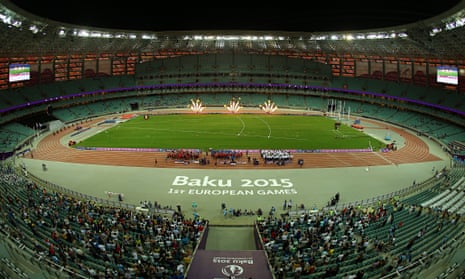If you have flicked to BT Sport at any point in the past fortnight, you may have witnessed hours of live coverage of a sporting event beamed in from the very fringes of Europe that appears to have been very professionally staged.
The branding, the sparkling venues, the breathless commentary, even the occasional famous face such as Britain’s Nicola Adams winning gold in the boxing. In between the action, adverts have proclaimed: “From the ancient land of Azerbaijan rises the first European Games.”
There has been a Team GB Twitter feed with excited updates from young competitors gurning in front of Baku landmarks and waxing lyrical about the bubble in which modern sporting events take place – the village, the food hall, the sense of camaraderie.
Yet it has been impossible to escape the impression, not least during the third-tier athletics competition taking place in a new, virtually deserted stadium, that this is a ghost games, one there is no real need for in a crowded calendar and willed into existence by the endless expansionism of the Olympic movement and an authoritarian state that has used it as an excuse to accelerate a crackdown on freedom of speech and democracy.
An endless stream of pro-government voices on Twitter have accused the Guardian (banned from entering the country]) and human rights groups (likewise) of politicising a sporting event that should be all about young people, athleticism, Olympism and so on, but it was Ilham Aliyev’s government that politicised these Games.
Regardless of its merits as a sporting occasion, if this new event had gone ahead alongside the release of some of the scores of political prisoners held by Aliyev’s regime on trumped-up charges then it could have justified some of the claims being made on its behalf as a progressive force for good in opening up this young country to the world. Instead, the crackdown intensified and freedom of speech was quashed. Since the Guardian was denied accreditation, the state news service has run a series of a articles accusing us of “theft” and “spy-like behaviour” over an article in December that sought to examine the rationale for the games against the backdrop of worsening human rights. The case of Khadija Ismayilova, the investigative journalist who has uncovered corruption and cronyism in the Azerbaijani elite and was arrested two days after she spoke to the Guardian for the piece that led to our being banned, has become emblematic. But there are dozens more including human rights campaigners Leyla and Arif Yunus, the Sport for Rights founder, Rasul Jafarov, and the human rights lawyer Intigam Aliyev.
The British Olympic Association’s chef de mission, Mark England, has repeatedly explained how the experience would benefit the 160 athletes in the team as they prepare for next year’s Rio Olympics. Yet there has been not a word from Team GB about the attendant human rights crackdown. Not from England, not from the chief executive, Bill Sweeney, and not from Lord Coe, the BOA chair.
Coe is in a difficult position. He is standing for the presidency of the International Association of Athletics Federations and needs to curry favour with some of those he would have been implicitly criticising. CSM, the agency of which he is chairman, helped design Baku’s bid for the games (not that it needed one, it was the only option) and draw up the host city contract.
Given his stand to compete at the 1980 Moscow Olympics, against the wishes of Margaret Thatcher, he has spoken eloquently – most recently in Sochi before last year’s Winter Games – of his deep-seated belief that sport and politics should be kept separate and of the former’s ability to make the world a smaller place. That now feels like an argument from the Cold War. The balance of power in world sport has definitively tilted towards wealthy non-democracies looking to use them as billboards, but that does not mean it should prostitute itself to the highest bidder. So desperate was the European Olympic Committees to establish the European Games it turned it over to Azerbaijan to do whatever it liked.
Reporters Without Borders ranks Azerbaijan 162 out of 180 countries for press freedom. The Committee to Protect Journalists ranks it as the fifth most censored country in the world. While Germany, Sweden and others spoke out, the BOA maintained it was “only here for the sport”. The BOA was not alone in keeping quiet. You cannot necessarily blame the athletes, many of them young competitors away from home at a multi-sport games for the first time, for not speaking out. They were there to compete, quite rightly, but you might have expected more from others.
Last October, Human Rights Watch awarded the International Olympic Committee a virtual “gold medal” for putting human rights in its host city contracts for the first time. The clause, part of Thomas Bach’s Agenda 2020 reforms that helped him win the presidency in 2013, referred to sustainability and labour laws rather than freedom of expression but were nonetheless hailed as a step in the right direction.
Six months later, there was Bach gathered with 70 or more IOC members in Azerbaijan and standing between Vladimir Putin and Aliyev at an opening ceremony that cost $100m and featured Lady Gaga singing John Lennon’s Imagine at a grand piano.
The IOC has hidden behind the fact that the European Games is not an official IOC event and pointed to its own protocols to ensure freedom of the press during the summer and winter Olympics. But Baku 2015 was conceived and organised by the European Olympic Committees and is inextricably bound up in the self-aggrandising movement. All the rhetoric about the Olympics promoting peace and tolerance can hardly amount to much if the rings are being used as cover to crack down on civil liberties and freedom of expression.
While IOC members politicked and plotted about the situation at Fifa, the continuing race for the 2022 Winter Olympics between Beijing and Almaty, Kazakhstan and a tortuous internal dispute surrounding an organisation called Sport Accord, few found any time to consider the reasons they were there. Pat Hickey, the head of the Irish Olympic Commitee who is also leader of the EOC and has long seen establishing the new event as a personal crusade, promised an interview to explain why the Guardian had been denied entry and insisted organisers had done all they could to press the case.
No interview was forthcoming and days later Hickey was gushing his thanks to Aliyev as he accepted a “medal of honour” for bringing the Games to Azerbaijan. Nor has Simon Clegg, the chief operating officer of Baku 2015 who was once the BOA chief executive, spoken out on the matter. Nor any of the many other westerners engaged to produce a Games costing billions of dollars in 30 months.
This week, the UN Human Rights Council delivered a lengthy condemnation of the human rights situation in the country signed by 25 countries including Britain. “It is unfortunate that, while Azerbaijan is investing significant efforts in promoting its image abroad, these efforts are being undermined by its actions at home,” it said. “We call on Azerbaijan to end its crackdown on civil society and respect fundamental freedoms, and to create and maintain, in law and in practice, a safe and enabling environment in which civil society can operate free from hindrance and insecurity.”
Meanwhile Aliyev, Hickey, the EOC and friends have already declared the event a great success and Baku is preparing to welcome Formula One next year and Uefa’s European Championship in 2020.
By banning critical voices that would have examined the context in which the event was being held, as well as the sport within it, without a whisper of protest from the international sporting community, others may wonder if they, too, can get away with it. Baku 2015 may yet be seen as a turning point for world sport – for all the wrong reasons.

